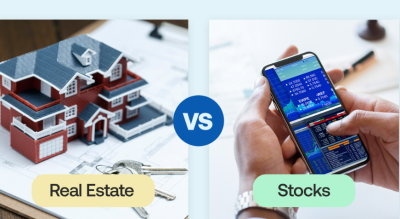The economic situation has been complex and volatile over the past two years, and anyone with some money is wondering:
where is the safest place to put their money, where can they outperform inflation and avoid losing everything? As the two main investment channels, real estate and the stock market, which is more reliable, has become a dilemma for investors.

Buying a house vs. Investing in stocks: What are the fundamental differences?
- Risk and return differences
Buying a house: Relatively low risk, long payback period, stable returns, and leverage.
Stocks/funds: High volatility, with the potential for doubling in a year or halving in an instant.
- Different thresholds
Buying a house: Requires a down payment, loans, qualifications, and housing purchase policy restrictions.
Stock funds: Open an account and trade at any time, and enter the market with just a few hundred yuan.
- Different added value
Buying a house: Beyond investment, it also provides a means of housing, household registration, and children's education.
Stock funds: Purely financial investment, they won't provide any practical convenience.

Advantages of both
- In real estate investment, property is a physical object that can be seen and touched. Real estate provides stable living and other practical functions. Properties in well-located areas in some cities have strong value preservation and appreciation. Furthermore, real estate investment is relatively less susceptible to short-term macroeconomic fluctuations. However, the capital threshold for real estate investment is high, transaction costs are high, the buying and selling process is cumbersome, and liquidity is relatively low.
- As for stock investment, the stock market offers flexible trading, convenient capital inflows and outflows, and rapid response to market fluctuations. Stocks of high-quality growth companies offer significant long-term return potential. Diversifying investments across various sectors can effectively mitigate risk. However, the stock market is highly volatile and influenced by a variety of factors, including the macroeconomy, industry policies, and company performance, making it difficult for ordinary investors to grasp the market.
From an investment perspective,the return model of real estate relies primarily on two factors:
rental income and asset appreciation. Rental income is relatively stable, with an annualized yield typically between 2% and 4%. This yield may seem low, barely covering the interest on bank loans. The true returns for real estate investors come from asset appreciation. The rapid rise in housing prices over the past two decades has enabled many to accumulate wealth.
Another issue with real estate investment is liquidity. Buying a property is easy, but selling it is difficult, especially during a market downturn. The process of converting a property into cash can often take months or even years. This low liquidity increases investment risk, and once funds are locked up, it's difficult to quickly adjust investment strategies.

Stock market investment is characterized by volatility
From January 2 to February 5, 2024, the All-A Equal Weighted Index fell 29.7% in 25 trading days. This sharp drop alarmed many investors. It then rebounded rapidly, with the A-share STAR Market 50 Index performing exceptionally well, rising 16.1% for the year, and the CSI 300 Index rising 14.7%. This roller-coaster trend tests investors' resilience.
The advantage of stock market investment lies in its high liquidity. The T+1 trading system allows investors to adjust their positions at any time. More importantly, the stock market can share in the dividends of economic growth, and the growth of high-quality companies can bring substantial investment returns. Over the long term, the average stock market return tends to outperform inflation.
The two investment methods differ fundamentally in terms of risk management.
Real estate investment is a physical asset with a certain degree of inflation resistance. Even if prices fall, the property itself still retains its value. Stock market investment faces operational risks and systemic market risks. In extreme cases, significant losses or even total losses can occur.
